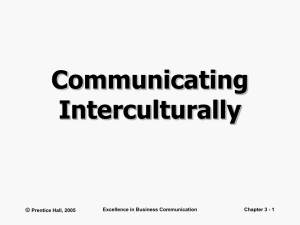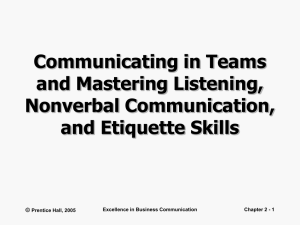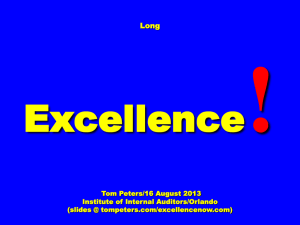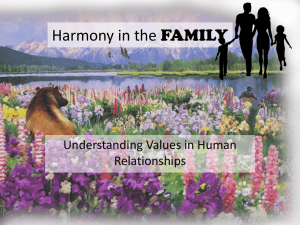here - Pearsoncmg
advertisement
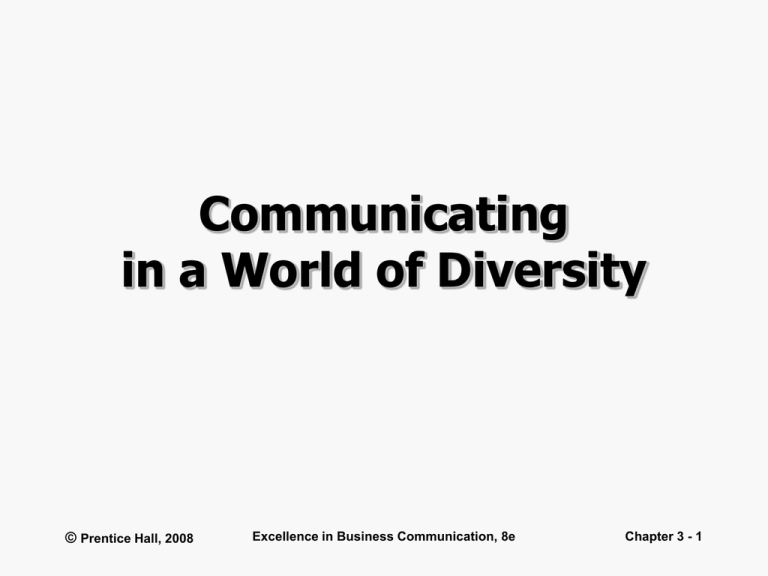
Communicating in a World of Diversity © Prentice Hall, 2008 Excellence in Business Communication, 8e Chapter 3 - 1 Communication in a Diverse World • Diversity – Individual characteristics – Individual experiences • Intercultural communication – Cultural backgrounds – Cultural differences © Prentice Hall, 2008 Excellence in Business Communication, 8e Chapter 3 - 2 Opportunities in a Global Marketplace • New customers • New labor sources • New job possibilities © Prentice Hall, 2008 Excellence in Business Communication, 8e Chapter 3 - 3 Advantages of a Diverse Workforce • Connect with customers • Expand talent pool © Prentice Hall, 2008 Excellence in Business Communication, 8e Chapter 3 - 4 Challenges of Intercultural Communication • Language, nonverbal signals, perception patterns, values and beliefs – Communicating with employees – Motivating employees – Promoting harmony and cooperation © Prentice Hall, 2008 Excellence in Business Communication, 8e Chapter 3 - 5 Enhancing Sensitivity to Culture and Diversity • Understanding the concept of culture • Overcoming ethnocentrism and stereotyping • Recognizing variations in a diverse world. • Adapting to U.S. business culture © Prentice Hall, 2008 Excellence in Business Communication, 8e Chapter 3 - 6 The Concept of Culture • Shared system – Beliefs – Symbols – Attitudes – Values – Expectations – Norms © Prentice Hall, 2008 Excellence in Business Communication, 8e Chapter 3 - 7 Characteristics of Cultures • Automatic • Coherent • Complete © Prentice Hall, 2008 Excellence in Business Communication, 8e Chapter 3 - 8 Negative Cultural Attitudes • Ethnocentrism • Xenophobia • Stereotyping © Prentice Hall, 2008 Excellence in Business Communication, 8e Chapter 3 - 9 Cultural Pluralism • Avoiding assumptions • Avoiding judgments • Acknowledging distinctions © Prentice Hall, 2008 Excellence in Business Communication, 8e Chapter 3 - 10 Recognizing Variations in a Diverse World • Contextual • Legal and ethical • Social • Nonverbal © Prentice Hall, 2008 • • • • Age Gender Religion Ability Excellence in Business Communication, 8e Chapter 3 - 11 Cultural Context • High-context and low-context – Decision-making practices – Problem-solving techniques – Negotiating styles © Prentice Hall, 2008 Excellence in Business Communication, 8e Chapter 3 - 12 Legal and Ethical Behavior • Seek common ground • Withhold judgment • Send honest messages • Respect differences © Prentice Hall, 2008 Excellence in Business Communication, 8e Chapter 3 - 13 Social Behavior Differences • Work and success • Roles and status • Use of manners • Concepts of time © Prentice Hall, 2008 Excellence in Business Communication, 8e Chapter 3 - 14 Nonverbal Differences • Greetings and touching • Personal space • Facial expressions • Eye contact • Posture • Formality © Prentice Hall, 2008 Excellence in Business Communication, 8e Chapter 3 - 15 Age Differences • Types of culture – Youth-oriented – Senior-oriented • Cultural associations – Power – Respect – Freedom © Prentice Hall, 2008 Excellence in Business Communication, 8e Chapter 3 - 16 Gender Differences • Existing workplace cultures • Communication styles © Prentice Hall, 2008 Excellence in Business Communication, 8e Chapter 3 - 17 Religious Differences • Personal beliefs • Inclusive workplaces © Prentice Hall, 2008 Excellence in Business Communication, 8e Chapter 3 - 18 Ability Differences • Assistive technologies – Customers – Colleagues – Employees © Prentice Hall, 2008 Excellence in Business Communication, 8e Chapter 3 - 19 Adapting to U.S. Business Culture • • • • • • Individualism Equality Privacy and personal space Time and schedules Religion Communication style © Prentice Hall, 2008 Excellence in Business Communication, 8e Chapter 3 - 20 Improving Intercultural Communication Skills • Study other cultures and languages • Respect communication styles • Speak and write clearly • Listen carefully to others • Use interpreters or translators • Help others adapt to your culture © Prentice Hall, 2008 Excellence in Business Communication, 8e Chapter 3 - 21 Studying Other Cultures • • • • • • Social customs Clothing and food Political patterns Religious and folk beliefs Economics and business Ethics, values, and laws © Prentice Hall, 2008 Excellence in Business Communication, 8e Chapter 3 - 22 Learning Languages • Facilitate communication • Promote business relationships © Prentice Hall, 2008 Excellence in Business Communication, 8e Chapter 3 - 23 Respecting Communication Preferences • Degree of formality • Level of directness • Writing or speaking © Prentice Hall, 2008 Excellence in Business Communication, 8e Chapter 3 - 24 Writing Clearly • • • • • • • Use simple, clear language Be concise (brief) Use transitional elements Address correspondence properly Cite numbers/dates carefully Avoid slang, idioms, and jargon Avoid humor or popular culture references © Prentice Hall, 2008 Excellence in Business Communication, 8e Chapter 3 - 25 Intercultural Conversations • • • • • Speak slowly and clearly Rephrase as needed Seek feedback Don’t patronize Double check for agreement © Prentice Hall, 2008 Excellence in Business Communication, 8e Chapter 3 - 26 Listening Carefully • Learn vocal patterns • Show respect • Ask questions © Prentice Hall, 2008 Excellence in Business Communication, 8e Chapter 3 - 27 Using Interpreters or Translators • Human beings – Interpretation – Cultural context – Non-verbal cues • Software – Translation – Words and phrases – Gist of the message © Prentice Hall, 2008 Excellence in Business Communication, 8e Chapter 3 - 28 Helping Others Adapt • Speaking and listening – Conference calls – Face-to-face conversations • Reading and writing – Intranet sites – Email and instant messaging © Prentice Hall, 2008 Excellence in Business Communication, 8e Chapter 3 - 29
